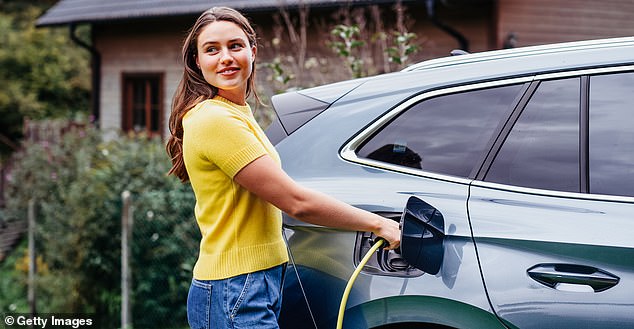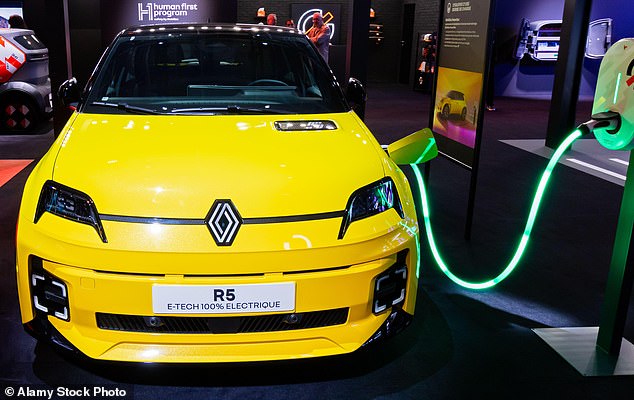By FREDA LEWIS-STEMPEL, MOTORING REPORTER
Updated:
Car buyers are being offered a cash incentive to purchase a new electric vehicle (EV) for the first time in three years.
The Government’s Electric Car Grant (ECG) – part of Energy Secretary Ed Miliband’s drive to net zero – will offer up to £3,750 towards the cost of a new EV.
However, the size of the discounts depends on how ‘sustainable’ the EV is – and the rules have left drivers confused.
So will the grants make EVs a cheaper option than petrol? Here’s what you need to know before you buy – and how to weigh up the costs.
What is the Electric Car Grant?
The ECG offers car buyers money off new all-electric models that are sustainably manufactured and priced at – or under – £37,000.
It is Labour’s take on the Conservatives’ Plug-In Car Grant, scrapped in 2022. The £650million scheme was revealed last month and runs until 2028-29.
Depending on how ‘green’ the car-production process is, they will fall into band 1 or band 2 of Government support, giving drivers either a £3,750 or £1,500 reduction to the price of eligible EVs.
The Government says the ECG will make ‘owning an electric car cheaper, easier and a reality for thousands more people across the UK’.

Which car makers are in the ECG?
At the time of writing, Citroen, Vauxhall, Nissan and Renault have models confirmed for the ECG – but only the lower £1,500 grant – with 17 EVs between them now automatically discounted for buyers.
Among the eligible EVs, the retro-inspired Renault 5 and Nissan Micra EVs are standouts – showing drivers can get behind the wheel of electrified nostalgic nameplates for less than £21,500.
While other manufacturers wait to hear whether they have been accepted some have proactively introduced their own electric car ‘grants’.
Chinese car makers such as MG were the first to react to the Government’s ECG news, but European marques including Alfa Romeo, Volvo and Skoda soon followed with discounts of up to £3,750 off selected EV models, creating a mini price war.
Leapmotor, Great Wall Motors, and Skywell have their own discounts as well, as do Fiat, Volkswagen, Cupra, Smart, Suzuki, Kia and Hyundai.
BYD is not offering a cash discount but instead giving buyers extended battery warranty across its entire range of EVs and five years’ free servicing.
How stringent is the ‘green’ criteria?
The criteria are rigorous and complex, and have left drivers, EV experts, and carmakers themselves scratching their heads. Rather than simply looking at tailpipe emissions of EVs, the Government is addressing the carbon emissions across the vehicle’s entire lifetime, rewarding the carmakers with the ‘highest manufacturing sustainability standards’.
Manufacturers must hold a Science Based Target, verified by the independent Science Based Targets initiative, which aligns with the Paris Agreement goals.
The Government assesses the carbon intensity of the electricity grid in the country where the vehicle is assembled and the battery produced.

It’s bad news for Chinese EVs: Transport Minister Lilian Greenwood recently warned that the Department for Transport doesn’t expect ‘any cars that are assembled in China to be eligible for the scheme’ because the country relies too heavily on coal power stations.
However, as EV manufacturing is a global business there are several European marques that could also be penalised for having part of their production based in China, making them eligible for only the £1,500 grant or nothing at all.
Why aren’t all makers part of the ECG?
Instead of coming up with a list of models that meet the ECG sustainability standards and releasing this alongside the grant announcement, the Government has instead asked carmakers to apply retrospectively to qualify.
The Department for Transport and Office for Zero Emission Vehicles say they are processing applications as fast as manufacturers can file them and will update the online list of eligible models as they are approved.
But that means manufacturers are out until they’re in, and the public and the car industry are being drip-fed the discounts as they come, causing hesitancy and uncertainty.
Figures from the Society of Motor Manufacturers and Traders (SMMT) revealed a cooling of EV sales in July. EV sales made up 21.3 per cent of the new car market last month.
At least 28 per cent of new cars sold by each manufacturer in the UK this year must be electric under the Government’s Zero Emission Vehicle (ZEV) mandate. Manufacturers that miss this target can expect fines.
Should you wait for the grant?
This depends on where along the EV buying process you are.
If you’re ready to purchase a new EV and know the model you want, then see if it’s being discounted by the manufacturer. Many of the offers expire at the end of September, and some end this month.
Unlike the Government’s grant, though, a carmaker’s discount is guaranteed. Some experts say there’s no point waiting to see if the model is eligible for the official ECG, only to find out it’s not and miss out on savings.
The manufacturer is offering a discount equivalent to the grant it expects to receive, so if it is then eligible, you haven’t lost out either. On the other hand, if you’re only loosely considering buying an
EV there’s no need to be hasty – you have years before the grant dries up.
You might as well shop for your new EV with the full list of eligible ECG models to hand – hopefully not too far way.
And many drivers appear to be doing just this, waiting to see which models qualify for a discount before taking the plunge on a plug-in car.
SMMT says July was the second-weakest month of battery electric growth this year, with registrations rising 9.1 per cent compared with the 34.6 per cent recorded in the first half of 2025.
Do the grants make EVs the better option?
The ECG doesn’t make a new EV affordable for many buyers, or necessarily cheaper than a petrol car.
Vauxhall’s eligibility for £1,500 discounts across its entire electric range takes the entry-level Corsa Electric down to £26,505.
But Vauxhall’s entry-level petrol Corsa is £19,410 – 26.7 per cent cheaper.
The upfront price isn’t the whole picture. Low running costs are a big draw of EVs, especially if you’re able to charge yours at home. Charging provider Ohme found that it costs £3.57 to travel 266 miles in a 51kWh Corsa Electric if you have a smart charging tariff that offers lower unit costs if charging at off-peak hours, compared with more than £40 (at 40mpg average fuel economy) for the equivalent petrol car.
It costs roughly £800-£1,000 to have a charger installed, so these costs need to be factored in, too.
As of June, charging the same model using a public charger from 10 to 80 per cent cost £20 (11.3p/mile) compared with the £42.91 to refuel the equivalent 1.2-litre petrol Corsa (11.72p/mile).
EVs can be easier to maintain as they have fewer parts and therefore require less routine maintenance, and they produce no exhaust emissions and therefore a cleaner environment.








